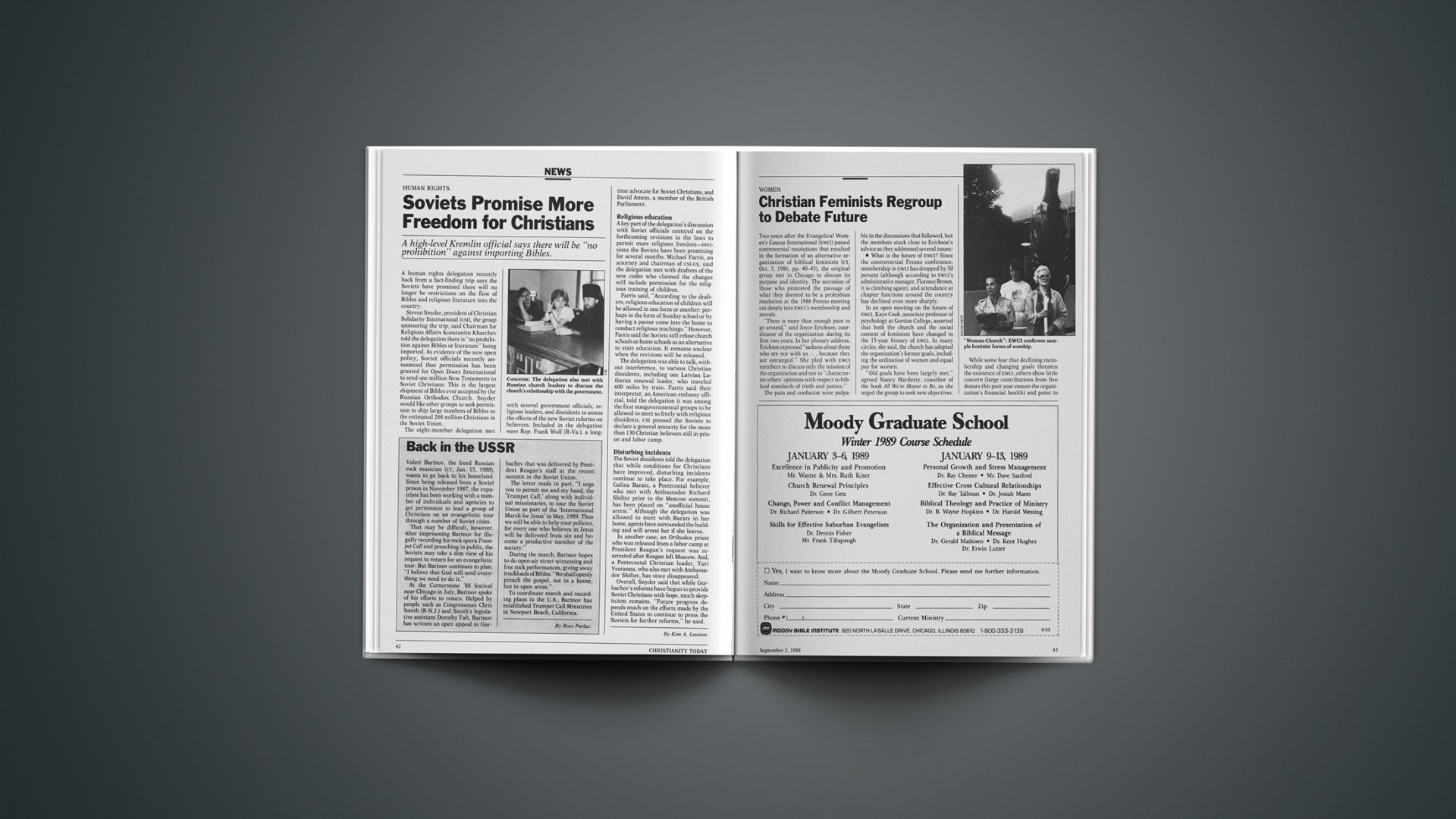HUMAN RIGHTS
A high-level Kremlin official says there will be “no prohibition” against importing Bibles.
A human rights delegation recently back from a fact-finding trip says the Soviets have promised there will no longer be restrictions on the flow of Bibles and religious literature into the country.
Steven Snyder, president of Christian Solidarity International (CSI), the group sponsoring the trip, said Chairman for Religious Affairs Konstantin Kharchev told the delegation there is “no prohibition against Bibles or literature” being imported. As evidence of the new open policy, Soviet officials recently announced that permission has been granted for Open Doors International to send one million New Testaments to Soviet Christians. This is the largest shipment of Bibles ever accepted by the Russian Orthodox Church. Snyder would like other groups to seek permission to ship large numbers of Bibles to the estimated 288 million Christians in the Soviet Union.
The eight-member delegation met with several government officials, religious leaders, and dissidents to assess the effects of the new Soviet reforms on believers. Included in the delegation were Rep. Frank Wolf (R-Va.), a long-time advocate for Soviet Christians, and David Amess, a member of the British Parliament.
Back In The Ussr
Valeri Barinov, the freed Russian rock musician (CT, Jan. 15, 1988), wants to go back to his homeland. Since being released from a Soviet prison in November 1987, the expatriate has been working with a number of individuals and agencies to get permission to lead a group of Christians on an evangelistic tour through a number of Soviet cities.
That may be difficult, however. After imprisoning Barinov for illegally recording his rock opera Trumpet Call and preaching in public, the Soviets may take a dim view of his request to return for an evangelistic tour. But Barinov continues to plan. “I believe that God will send everything we need to do it.”
At the Cornerstone ‘88 festival near Chicago in July, Barinov spoke of his efforts to return. Helped by people such as Congressman Chris Smith (R-N.J.) and Smith’s legislative assistant Dorothy Taft, Barinov has written an open appeal to Gorbachev that was delivered by President Reagan’s staff at the recent summit in the Soviet Union.
The letter reads in part, “I urge you to permit me and my band, the ‘Trumpet Call,’ along with individual missionaries, to tour the Soviet Union as part of the ‘International March for Jesus’ in May, 1989. Thus we will be able to help your policies, for every one who believes in Jesus will be delivered from sin and become a productive member of the society.”
During the march, Barinov hopes to do open-air street witnessing and free rock performances, giving away truckloads of Bibles. “We shall openly preach the gospel, not in a house, but in open areas.”
To coordinate march and recording plans in the U.S., Barinov has established Trumpet Call Ministries in Newport Beach, California.
By Ross Pavlac.
Religious Education
A key part of the delegation’s discussion with Soviet officials centered on the forthcoming revisions in the laws to permit more religious freedom—revisions the Soviets have been promising for several months. Michael Farris, an attorney and chairman of CSI-US, said the delegation met with drafters of the new codes who claimed the changes will include permission for the religious training of children.
Farris said, “According to the drafters, religious education of children will be allowed in one form or another: perhaps in the form of Sunday school or by having a pastor come into the home to conduct religious teachings.” However, Farris said the Soviets still refuse church schools or home schools as an alternative to state education. It remains unclear when the revisions will be released.
The delegation was able to talk, without interference, to various Christian dissidents, including one Latvian Lutheran renewal leader, who traveled 600 miles by train. Farris said their interpreter, an American embassy official, told the delegation it was among the first nongovernmental groups to be allowed to meet so freely with religious dissidents. CSI pressed the Soviets to declare a general amnesty for the more than 130 Christian believers still in prison and labor camp.
Disturbing Incidents
The Soviet dissidents told the delegation that while conditions for Christians have improved, disturbing incidents continue to take place. For example, Galina Barats, a Pentecostal believer who met with Ambassador Richard Shifter prior to the Moscow summit, has been placed on “unofficial house arrest.” Although the delegation was allowed to meet with Barats in her home, agents have surrounded the building and will arrest her if she leaves.
In another case, an Orthodox priest who was released from a labor camp at President Reagan’s request was rearrested after Reagan left Moscow. And, a Pentecostal Christian leader, Yuri Veeranna, who also met with Ambassador Shifter, has since disappeared.
Overall, Snyder said that while Gorbachev’s reforms have begun to provide Soviet Christians with hope, much skepticism remains. “Future progress depends much on the efforts made by the United States to continue to press the Soviets for further reforms,” he said.
By Kim A. Lawton.










